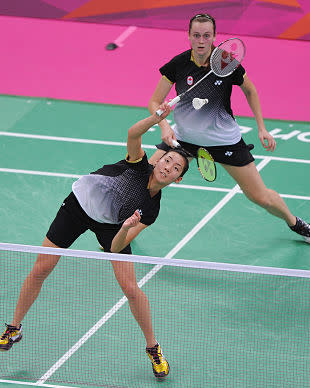Danes want credit for helping Team Bruce Li get reprieve in badminton
Hey, Team Bruce Li — you're welcome.
There's always another side to a story at the Olympics. Canada's Alexandra Bruce and Michele Li, as you know, had a whirlwind Wednesday in the wild world of women's doubles badminton, as they went went from planning to watch the matches to getting a second chance due to a match-throwing scandal. Then they buried their chance, upsetting Australia to boldly go where no Canadian Olympic badminton team has gone before. Ironically, though, Denmark's Kamilla Rytter Juhl and Christina Pedersen, who actually beat one of the ousted heavyweights to kick off the whole shuttlecock-up of tanking, lost their quarter-final.
In Juhl's mind, her team's win over China was a gift that Team Bruce Li should appreciate. In 2006, Canadians sent 7,400 cans of maple syrup to Norwegian cross-country skiing coach Bjørnar Håkensmoen after he passed a pole to Sara Renner, allowing her to win a silver medal. This wasn't direct aid, but Juhl and Pedersen ought to have something coming.
In the lose-to-win scandal that shook badminton and the London Games on Wednesday, finishing with four women's doubles teams disqualified from the quarterfinals, Juhl and Danish partner Christinna Pedersen were the spark to it all.
Their surprise win over second-seeded Chinese pair Tian Qing and Zhao Yunlei on Tuesday upended the expected quarterfinals lineup and caused China's world champions, two South Korean teams and an Indonesian duo to try and lose against each other for better matchups in the last eight.
Those teams were booted out for humiliating the sport, and teams from Russia, Canada, Australia and South Africa — countries which have never won an Olympic badminton medal — were handed second chances.
... "We know (our Tuesday win over China) is the reason why all this happened," Pedersen said. "When we said goodnight [Tuesday] night we were smiling, we had no idea we'd start this circus in the badminton world."
An emotional Juhl added, "I'm not happy with all that's going on right now. I hope Russia and Canada and the two other couples will come and give us thanks because Russia and Canada will have a medal, and I would like to have it myself." (Associated Press)
Hopefully, the Canadians will say thanks. Presently, their to-do list is fairly full, since they have the semifinal Wednesday at 1:30 ET against Japan's Mizuki Fujii and Reika Kakiiwa.
Many have pointed out the four Asian teams' actions were enabled by a tournament format that encouraged trying to game the draw. Even Li, a primary beneficiary of the outcome, was quoted by the AP saying, "It's not right that we get to play again and it's not wrong. But a chance opened up for us and it's a miracle." It's also worth noting that Juhl described it as a "shame."
At the end of the day, the Badminton World Federation ignored the money-talks principle, so to speak. Former Canadian Olympian Anne Rice noted this was not a time to play politics, since a sport that seldom gets mainstream media attention had become a laughingstock.
The BWF, whose political and financial strongholds are traditionally located in China, Indonesia and Korea, disqualified athletes from each of these countries, and inside sources claim that the decision was taken despite threats from China that it would pull its entire team from the Olympic badminton competition in protest.
Furthermore, the decision to disqualify the Chinese women's doubles team will likely cause serious financial blowback in the coming two years, which the BWF understood full well before pulling the DQ trigger.
What's more, the president of our world body, Mr. Kang Young Joong of Korea — himself a former president of the Korean Badminton Federation — would have had to approve this decision to disqualify these four teams.
All of the disqualified are medal contenders, and two of them hail from his home country. Mr. Kang's personal profile could take a big hit in his home country as a result of this decision.
Critics will argue that this newly implemented pool play system was flawed, and surely it was. The pool play should have consisted of a blind crossover, which would remove the incentive to throw the matches. The BWF will almost certainly alter, if not eliminate, this system all together in time for the Rio Olympics in four years.
However, our sport's world leaders have done the right thing. (CBC Sports)
Meantime, Bruce and Li have two matches left in their do-you-believe-in-unlikelihoods Olympic ride.
Neate Sager is a writer for Yahoo! Canada Sports. Contact him at neatesager@yahoo.ca and follow him on Twitter @neatebuzzthenet.

 Yahoo Sports
Yahoo Sports 



